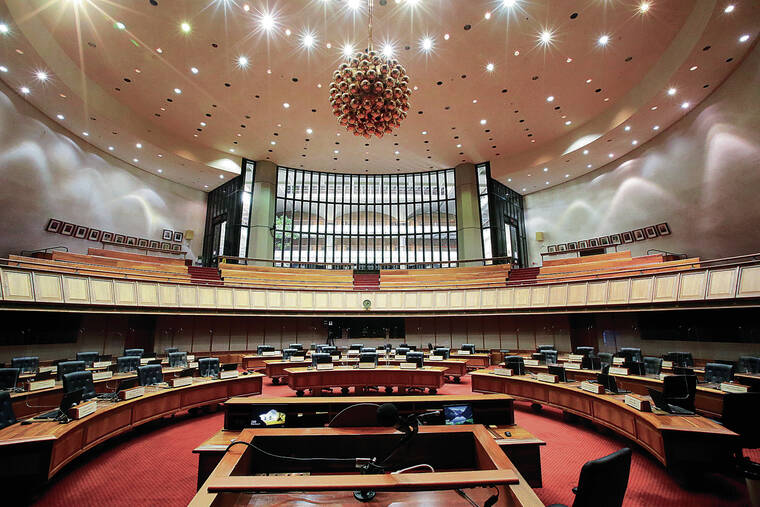Hawaii Legislature’s session once again to begin quietly

JAMM AQUINO / JAQUINO@STARADVERTISER.COM
The new legislative session begins today at the state Capitol. Pictured is a view from the speaker’s podium on the floor of the House chambers Friday.
Today’s opening of the new legislative session once again will be a staid affair absent music, dance and spreads of food following nearly two years of COVID-19-induced layoffs, unemployment and struggles for island businesses.
House Speaker Scott Saiki on Tuesday was still writing his remarks for today’s Opening Day House floor session, but told the Honolulu Star-Advertiser that the theme will be “economic justice, cultural justice and environmental justice.”
Otherwise, “it’s going to be a bare-bones floor session,” Saiki said.
On the Senate side, Senate President Ron Kouchi anticipated that the floor session “will be quiet and quick.”
“Everything is obviously driven by COVID and the omicron higher rate of contagion and infection,” he said.
The Senate last week announced a long list of priorities for this session, but Kouchi said none are higher than his concern over lost educational opportunities because of COVID-19.
Don't miss out on what's happening!
Stay in touch with breaking news, as it happens, conveniently in your email inbox. It's FREE!
“What worries me the most is the learning loss,” Kouchi said. “How do we regain the learning loss that has occurred and may have a generational effect? … The inability to obtain educational opportunities is a factor that may affect earning potential.”
The last of the traditional legislative session ceremonies ended after 2019, when Henry Kapono &Friends performed in the House, which also saw an oli and prayers, poi-pounding in the Capitol rotunda and an above-ground imu next door on the grounds of Iolani Palace.
That was the last year that legislators packed their offices with lavish spreads of food to share with supporters and lobbyists on the first official day of the session. (Saiki said administrative rules prohibit alcohol in state buildings.)
“The members were allowed to open their offices that day, so there was food,” Saiki said. “It has scaled back over the years considerably.”
Today, he said, the only food served in legislators’ offices is likely to be “from some of the members who will order lunch for their staffs.”
The new, toned-down Opening Day events began with the 2020 session, on the eve of the COVID-19 pandemic.
Supporters of Donald Trump had just stormed the U.S. Capitol to disrupt the electoral certification of now-President Joe Biden.
Across the country nearly 5,000 miles away, security was tight at the state Capitol on Opening Day as Biden was simultaneously sworn into office.
“I didn’t even give a speech in 2020,” Saiki said. “I delayed it.”
Then the Capitol was ordered off-limits to the public midway through the 2020 session, and remains off-limits for the third year in a row because of COVID-19.
But new state Rep. Linda Clark (D, Lanai-Molokai-Paia-Hana) is expected to be introduced today in the House and will be allowed to have two people supporting her in the chamber’s gallery.
Despite COVID-19, House members had been ordered to attend every committee meeting and floor session in person, except for legitimate reasons.
This year they will be allowed to attend hearings remotely via Zoom — at least through Feb. 2 — “because of the spike” in omicron cases, Saiki said.
Senators already have been allowed to attend meetings virtually.
There has been little word on planned rallies, protests or demonstrations in the open-air, street-level Capitol rotunda, which remains accessible to the public.
Daniel Anthony, a local subsistence farmer, was part of a group that held rallies in and around the Capitol grounds for 12 consecutive years —until today.
In 2019 Anthony lit the Iolani Palace imu and was later arrested while supporting Native Hawaiian rights.
Last year he was part of a group that placed 1,000 Hawaiian flags on the Capitol lawn as a show of support for local food sustainability and farmers.
But Anthony became disillusioned when he felt the message was not properly attributed and by “the fact that they don’t do anything for us.”
“And then when we show up, they take our political messaging and really appropriate it for themselves,” he said. “So the idea of going back to the Capitol this year was actually gut-wrenching to me.”
So Anthony won’t even show up and instead is organizing an Opening Day rally across the island at Kahana Valley Beach Park to support local agriculture and food sustainability.
The plan today is to plant about 600 ulu trees in Kahana Valley Beach Park that could eventually provide thousands of pounds of fruit in the next three to 10 years.
The land belongs to the state, and Anthony’s group does not have permission from the state Department of Land and Natural Resources.
“We cleared over 2 acres of state land with no permits,” he said. “If the state is going to stop us from planting after we have gone to them asking for help, we have no sympathy for them.”
Anthony almost lost his farm during the pandemic due to ownership issues. He said he reached out to lawmakers but received no support.
Instead, he was able to raise $600,000 in 90 days to save his farm.
Anthony wants legislative leaders to reopen the Capitol to the public — and especially provide more support for local farmers.



